Online dating scams: 11 warning signs and how to outsmart them

Online dating can be a great way to meet new people, but it’s also become a popular tool for scammers. Behind many perfect profiles are people trying to steal more than just your heart. They use emotional manipulation, false urgency, and convincing stories to gain your trust and then your money.
These scams often start out looking completely normal. The conversation feels genuine, maybe even exciting, until things suddenly take a turn. A request for help. A too-good-to-be-true investment tip. Or a push to move off the app.
In this article, I’ll describe how online dating scams work, what red flags to watch for, and how to protect yourself on dating apps. You’ll also learn what to do if you’ve already been scammed and how to date safely going forward.
What are online dating scams?
Online dating scams are a type of internet fraud where someone pretends to be romantically interested in you, with the real goal of stealing your money, your personal data, or both. The scammer typically creates a fake identity, initiates an online relationship, and gradually directs the conversation toward their desired outcome.
Some scams are simple. Others are run by groups who do this full-time—creating multiple fake profiles, copying real people's photos, and using the same lines on dozens of people until someone takes the bait.
What makes these scams dangerous is how personal they feel. This is very different from a standard phishing email—it’s a conversation that seems genuine and even intimate. By the time the scam becomes obvious, many victims are already emotionally involved and financially exposed.
How dating scams work: Emotional manipulation and urgency
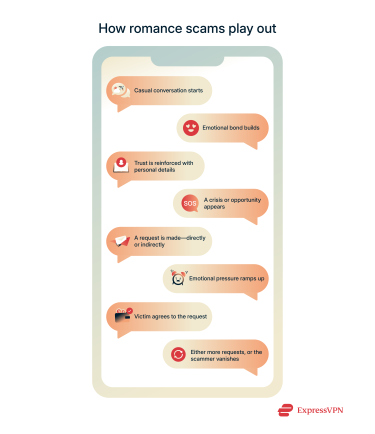 Romance scammer tactics are designed to feel personal. The goal is to lower your defenses before your judgment has time to intervene. You’re not being tricked in a single moment—you’re being steered, slowly, into a position where saying yes feels easier than stopping to question what’s happening.
Romance scammer tactics are designed to feel personal. The goal is to lower your defenses before your judgment has time to intervene. You’re not being tricked in a single moment—you’re being steered, slowly, into a position where saying yes feels easier than stopping to question what’s happening.
That’s why these scams often feel believable. You’re responding to a pattern of warmth, vulnerability, and familiarity. And then, just as trust begins to form, the urgency arrives: a sudden hospital bill, a frozen bank account, an “investment opportunity” they don’t want you to miss.
By the time money enters the conversation, it doesn’t feel like a scam. It feels like helping someone who’s been open with you. And by then, stopping to think feels harder than just going along with it. It’s a form of social engineering where the goal isn’t to fool you immediately but to guide your decisions without you noticing.
What platforms do dating scammers use most often?
Scammers go where the conversations are—and where moderation is weakest. Here's where they show up most often, and why:
- Tinder, Bumble, and Hinge: Easy to set up fake profiles and start conversations with minimal friction. The scam usually moves off the app quickly.
- Instagram and Facebook dating: A message from “someone nearby” or “a friend of a friend” often isn’t what it seems.
- WhatsApp and Telegram: These platforms are private and almost impossible to monitor.
- Plenty of Fish (POF), Grindr, and niche sites: Often used for scams involving explicit photos.
- LinkedIn: Less obvious, but increasingly used for romance-investment hybrids, especially cryptocurrency scams with a “professional” tone.
No platform is immune—but anytime someone rushes the conversation off-app or avoids normal behavior (like video calls or in-person meetings), it’s worth slowing down and taking a second look.
How can you spot an online dating scammer?
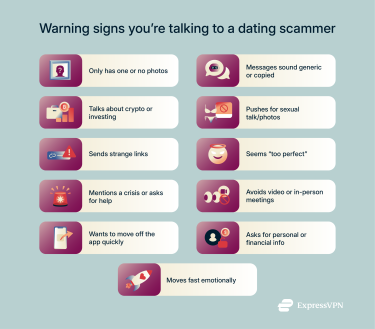 Romance scammers don’t usually show up waving red flags. They build trust by mimicking real people: borrowing photos, revealing emotional information, and copying the rhythm of normal conversations. But even the best fake persona tends to break under closer attention. Here are the most telling signs you’re not talking to who you think you are:
Romance scammers don’t usually show up waving red flags. They build trust by mimicking real people: borrowing photos, revealing emotional information, and copying the rhythm of normal conversations. But even the best fake persona tends to break under closer attention. Here are the most telling signs you’re not talking to who you think you are:
1. They only have one or no profile photos
A single profile picture isn’t a red flag in itself, but combined with other factors, it can be. Most real users post a few casual shots: a selfie, a photo with friends, maybe one outdoors. Scammers often rely on just one image, and it often looks overly polished or oddly generic because it’s pulled from stock photography or someone else’s social profile.
That said, with AI image generators and face-swapping tools now easy to access, scammers can create entire sets of fake but convincing photos that pass a quick glance. Nowadays, it’s a good idea to look at the context, not just the image count. Do the photos feel personal or staged? Do they match what the person says about themselves?
If something feels off, you should exercise caution.
2. They talk about crypto or investment opportunities
This one’s become so common that entire scam rings now operate under the name “pig butchering.” It’s a method where scammers “fatten you up” emotionally before draining you financially.
They usually won’t bring up crypto right away. First, they build trust. Then they start talking about financial freedom, “trading tips,” or an uncle who taught them everything. It feels like they’re letting you in on a secret.
They’ll often send screenshots showing fake returns or invite you to join an “exclusive” platform. But it’s all designed to create FOMO and get you to send money to a wallet you don’t control.
3. They send strange links right after matching
Scammers love shortcuts. If someone sends you a link before any real conversation starts, it’s almost never safe to click.
Some links lead to phishing scams, often disguised as dating app logins or Google accounts. Others will download spyware to your device. If the link looks odd or uses a domain you don’t recognize, don’t engage. Genuine people don’t cold-drop links before even learning your name.
4. They claim to be in a crisis or need financial help
This is one of the oldest tricks and still one of the most effective. After a few days or weeks of conversation, they drop a crisis into the story, often with a subtle sense of shame or vulnerability. Maybe they’re stranded while traveling. Maybe their sibling is in the hospital. Perhaps they just need a small loan to cover a temporary expense.
They don’t always ask for money directly. Sometimes they hint at a problem, wait for you to offer help, then “reluctantly” accept.
5. They want to move off the app quickly
Scammers don’t want to be reported or flagged. That’s why they often try to move the conversation to WhatsApp, Telegram, or SMS almost immediately. They'll say things like, “I don’t check this app much,” or “Let’s talk somewhere more private.”
But the real reason is control. Off-platform, they avoid moderation and can increase the psychological pressure. The conversation feels more personal and therefore harder to walk away from.
If someone’s eager to leave the app before you’ve even had a real exchange, they’re not building a connection. They’re setting a trap instead.
6. The relationship moves too fast
If someone tells you you’re “the one” by day three or starts using pet names within a few messages, it’s not romance. They’re simply following the script. Many scammers follow tested scripts designed to build emotional momentum quickly. The more emotionally invested you feel, the less likely you are to question their behavior later.
They might reference shared values, say they’ve never felt this way before, or mirror back everything you say. It’s not just love-bombing; it’s strategy. Remember that real intimacy takes time to establish.
7. Their messages sound copied or generic
If their texts read like they’re coming from a chatbot or a Hallmark card, they probably are. Scammers often use scripted lines: formal language, strange phrasing, or awkward compliments like “Hello dear, how are you this beautiful evening?”
But again, AI has made this harder to detect. Many scammers now use AI tools that generate warm, natural-sounding replies and remember details from earlier chats. The conversation may feel real, but it’s not.
So it’s no longer enough just to watch for stiff language—you should also be wary of responses that feel too polished, too fast, or too perfectly matched to everything you say.
8. They push for sexual talk or photos
Some scammers try to move the conversation in a sexual direction quickly as a setup for sextortion. If you send explicit photos, they may use them to blackmail you later, threatening to send them to your contacts unless you pay.
Others bait you into downloading fake “adult chat” or sexting apps or signing up for sites that steal your payment info. If someone you’ve just met is pushing for intimate talk or photos within the first few messages, it’s best to end the conversation right there.
9. They seem too perfect or “too good to be true”
If someone looks like a model, has an impressive job, shares all your interests, and immediately wants a serious relationship, you need to ask yourself why they’re still single.
Scammers build profiles that are designed to be exactly what you’re looking for. They study dating app behavior and adjust based on what gets responses. The goal isn’t to be realistic. It’s to be irresistible. If it feels too ideal to be real, it probably is.
10. They avoid video calls or in-person meetings
Scammers almost always have a reason why they can’t talk face-to-face. They’re traveling, their camera’s broken, or they’re “not good with video.” Whatever the excuse, they keep dodging calls or canceling meetups last minute. This is a definite red flag that indicates they’re not who they claim to be.
That said, advanced AI tools have made it possible to fake someone’s face or voice, even during live video calls. It’s already happened in some scams, and while it’s not widespread in dating yet, it’s only going to get easier and more sophisticated.
That’s why meeting in person—somewhere safe and public—is often the best way to know who you’re really talking to.
11. They ask for personal or financial information
This is usually the final stage of the scam, but sometimes it shows up early. The scammer may ask for your full name, address, job, or how much you earn. Later, they might request banking details, crypto wallet IDs, or even ask you to open new accounts for them.
Sometimes it’s subtle: “Can you do me a quick favor?” Other times, it’s framed as romantic trust: “I’d only ask someone I really care about.”
If someone you’ve never met is asking for anything tied to your identity, your money, or your reputation, you can safely assume they’re not who they say they are and cut off contact.
What are the most common online scams?
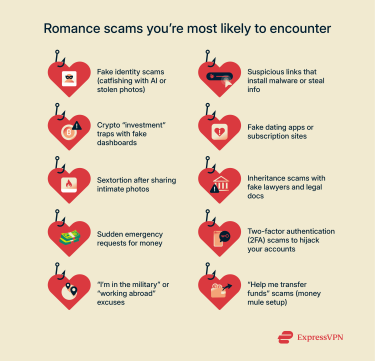 Romance scams come in many forms—some obvious, others difficult to spot until it’s too late. Below are the most common types, how they work, and why they continue to fool people across dating apps and social platforms.
Romance scams come in many forms—some obvious, others difficult to spot until it’s too late. Below are the most common types, how they work, and why they continue to fool people across dating apps and social platforms.
Catfishing scams
This is the foundation of most long-term romance scams. A scammer creates a fake identity, usually with stolen or AI-generated photos, a vague but believable backstory, and just enough charm to feel real. The goal is usually money. But first, they need you to care.
Catfishing builds emotional trust. That connection makes it easier to push you toward sextortion, fake emergencies, crypto investments, or anything else that ends in a financial ask. The longer it drags on, the harder it becomes to walk away—because even when the profile is fake, the bond can feel real.
Crypto investment scams
Once trust is built, scammers may shift the conversation toward “helping” you invest, often in crypto. You might hear about a trading platform they’ve used, a “mentor” who helped them, or a sudden opportunity with high returns.
At this point, you're shown fake dashboards and screenshots to build credibility. Everything looks legitimate until you try to withdraw funds. The platform vanishes, your contact ghosts you, and the money is unrecoverable.
These scams aren’t always fast—some play out over weeks or months. The emotional connection keeps you hooked even as red flags appear.
Intimate photo scams (sextortion)
Some scammers take a different route: they build rapport quickly, then steer the conversation toward sexual content. They may ask for photos, initiate explicit video calls, or convince you to share compromising content under the guise of flirtation.
What follows is classic blackmail. They threaten to release the material unless you send money (or sometimes more photos). Some even claim they’ve already sent it to others and demand payment to “stop it.”
Emergency or help scams
This scam always comes with a story. Maybe they’re traveling and lost access to their bank account. Maybe their sibling had an accident. Maybe they’re in the military and can’t receive funds through normal channels.
Whatever the crisis, it’s sudden, emotionally charged, and comes after a period of warmth and vulnerability. It often starts with “I didn’t want to ask, but…” and ends with a request that feels temporary and low-risk.
The first request is rarely the last. If you send money once, you're marked as a willing participant.
Military or overseas professional romance scams
These scammers pose as soldiers, doctors, or engineers working abroad—roles that justify long absences and limited contact. It gives them built-in excuses for avoiding video calls or meeting in person.
Once trust is built, they ask for help: money for customs, transport, or “temporary banking issues.” Sometimes they’ll send fake ID cards or documents to make it look official.
The real tactic is simple: use authority and distance to avoid questions and hope the uniform or professional persona earns your trust.
Malware and suspicious link scams
Some scams skip the relationship altogether. The scammer sends you a link shortly after matching—maybe to “verify your account,” “see more pics,” or access a private chat. The page may look like a dating app or a Google login, but it’s a phishing trap.
Other times, the link installs malware on your device, allowing the scammer to steal credentials or access messages. These scams usually target large numbers of people at once, hoping a small percentage click before deleting.
If the first thing they do is send you a link, you can assume they’re not there to talk but to scam.
Fake dating sites
Scammers often promote entire dating platforms that don’t exist, usually through ads, social media messages, or even fake profiles on real apps. These sites are designed to collect personal info or charge subscription fees for fake features.
Some allow you to chat with bots pretending to be real users, keeping you engaged until you pay for access. Others are loaded with malware or data harvesting tools.
If you can’t find real reviews, if every profile seems too eager, or if support contact details are missing, it’s safer to walk away.
Inheritance scams
This variation typically unfolds after some relationship buildup. The scammer claims they’ve received a large inheritance or financial windfall but need help accessing it due to legal or bureaucratic blocks. Sometimes they’ll say they’ve named you in their will.
The request usually involves helping with legal fees, processing costs, or even traveling to claim funds. Fake documents are common, as are fake lawyers. It feels personal and flattering—and that’s what makes it work.
What starts as a romantic connection becomes a long con built around fantasy wealth.
Dating site two-factor code (2FA) scams
In this scam, the attacker tricks you into sharing a two-factor authentication code, often by pretending to be a dating platform verifying your identity. In reality, they’re trying to log into one of your accounts and need the code you just received.
They might say, “You’ll get a security code from the app; just send it to me so I know you’re real.” But that code is the final step to hijack your account.
Once they’re in, they can impersonate you, target your matches, or demand money to return control over your profile.
Money mule recruitment scams
This scam is subtler. The scammer doesn’t ask for money—they ask you to “help” with transfers. They might say they need someone in your country to receive a payment for them or forward a transaction to a family member.
It’s framed as a favor—but in reality, you’re being used to move stolen or laundered funds, turning you into a money mule. This is illegal, even if you didn’t realize what was happening.
These scams blur the line between victim and accomplice, which is exactly what makes them so dangerous.
How to outsmart a romance scammer
Romance scams rely on two things: emotional momentum and hesitation about asking questions. Here's what to do to ensure you don’t get taken in.
Questions to ask early to reveal red flags
Start with simple questions, but go deeper than small talk. Don’t just ask what someone does or where they live—ask about their routine, their hometown, their family, even the last movie they saw. Then bring it up again later.
Scammers often slip up when the details get personal. They may answer vaguely, avoid specifics, or forget what they said the first time. Real people tend to stay consistent because they’re speaking from real experience.
If you’re not sure, check what they tell you. Look up the place they say they work. Ask about a friend in one of their photos. If the story falls apart under basic scrutiny, you have your answer.
How to verify someone’s identity safely
You don’t need to hire a private investigator. Just be thorough. Reverse search their profile photo. Look up their name alongside keywords like “scam” or “fake profile.” Check if their job, location, or lifestyle claims add up. Does the timeline make sense? Do their answers stay consistent?
And whenever possible, meet in person (always somewhere public and safe). It’s the most reliable way to know if someone is who they claim to be. Just keep in mind: even face-to-face, a scammer can still lie—like the Tinder Swindler. But it’s a lot harder to fake everything when you’re offline.
Also, remember that a real person won’t mind if you take your time and exercise caution. A scammer, on the other hand, will try to make you feel guilty for being careful.
When to walk away or report the profile
You don’t need proof to walk away. If something feels off, it’s fine to simply cut contact.
You can then block the user and report the profile. Most platforms have built-in options to flag suspicious behavior—use them. Even if you're not sure it’s a scam, your report might stop someone else from getting pulled in.
Why rushing into romance online is dangerous
Real relationships take time. If someone says they love you after a few chats or wants to make big plans right away, slow down.
Fast relationships are easier to manipulate. If you don’t give yourself time to think, it’s easier to miss what’s wrong. Anyone pushing you to move fast is usually trying to bypass your better judgment.
What to do if you’ve been scammed
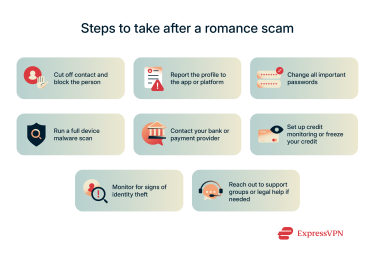 If you’ve been caught in a dating scam, the most important thing is to act quickly. The longer you wait, the harder it is to recover money, stop identity misuse, or help others avoid the same trap. Don’t waste time trying to outsmart the scammer; just cut contact and take the following steps.
If you’ve been caught in a dating scam, the most important thing is to act quickly. The longer you wait, the harder it is to recover money, stop identity misuse, or help others avoid the same trap. Don’t waste time trying to outsmart the scammer; just cut contact and take the following steps.
How to report a dating scammer
Block the scammer on every platform they’ve contacted you through. Then report the account to the app or website. Most dating apps have a “Report” button near the profile or message window—use it even if you’re unsure. These reports help companies detect fake profiles faster.
You should also report the scam to your country’s cybercrime or fraud agency. In the U.S., that’s the FTC and IC3. In the U.K., it’s Action Fraud. Don’t worry about having every detail; just file the report with what you know.
Steps to secure your identity and accounts
If you’ve shared personal or financial information with a scammer, here’s what to do:
1. Change your passwords immediately
Start with your email, banking, and social media logins. If you’ve reused the same password across multiple sites, change those too. Using a password manager like ExpressVPN Keys makes it easier to generate and store strong, unique passwords going forward.
2. Alert your bank or payment provider
If you sent money, notify your bank or payment service right away. Some platforms can freeze transfers or help you dispute fraudulent charges if you act quickly.
3. Monitor your credit and identity
If you shared details like your address, ID number, or credit card info, contact your bank or credit bureau to flag the risk. In many countries, you can request a fraud alert or credit freeze to stop new accounts from being opened in your name.
In the U.S., ExpressVPN Identity Defender offers identity monitoring and theft protection, including breach alerts and insurance coverage if your identity is compromised.
4. Scan your device for malware
If you clicked strange links, downloaded files, or logged into a suspicious site, run a full antivirus or malware scan on your device. This can help detect and remove spyware or tracking tools that scammers may have installed.
Where to get emotional and legal support
Romance scams can leave you feeling embarrassed, isolated, or even ashamed. But you’re not alone: many people have fallen victim to these scams. It’s important to report the scammer even if you’re feeling embarrassed about the situation, as it helps stop others from making the same mistake.
You can also look for support groups that deal with online fraud or financial abuse. Some countries have helplines specifically for scam victims. You don’t need to go through it alone.
If large sums of money were involved, speak to a legal expert or consumer protection agency. You may not always be able to recover the funds, but documenting the scam can still help.
What to expect when reporting to authorities
Most agencies will take your report, but they may not follow up unless the scam involved major financial loss or was part of a larger operation. That doesn’t mean your report didn’t help. It may be the missing piece in a larger investigation.
In some cases, your report could prevent others from being targeted by the same scammer. Just be honest, direct, and stick to the facts of what happened.
How to stay safe while dating online
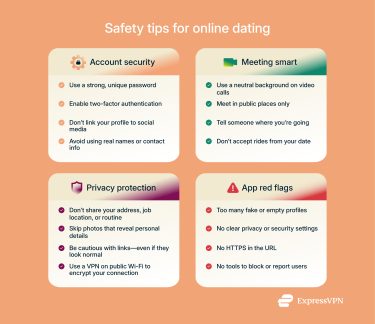 Staying safe while dating online isn’t just about avoiding scams—it’s about protecting your privacy at every step. From setting up your profile to meeting in person, small habits can make a big difference. Here’s how to reduce your risk and stay in control of your information.
Staying safe while dating online isn’t just about avoiding scams—it’s about protecting your privacy at every step. From setting up your profile to meeting in person, small habits can make a big difference. Here’s how to reduce your risk and stay in control of your information.
Security best practices for online dating
Set a strong, unique password for your account. Use two-factor authentication if the app supports it. Don’t link your dating profile to your main social media, and keep your real name, email, and phone number out of your profile. Finally, be cautious with links—even if they look harmless.
Tips for your first video or in-person meeting
For video calls, use a plain background and avoid showing your home. For in-person meetings, choose a public place and tell someone where you’ll be. Don’t depend on your date for a ride. Stay alert, keep your phone charged, and leave if anything feels wrong.
How to protect your privacy and personal info
Never share your address, job location, or routine with someone you just met, and skip the personal photos if they show too much about your life. If someone requests private details or financial help, cut contact immediately.
Using a VPN can also help protect your location details and privacy by masking your IP address and encrypting your data.
Signs a dating platform may not be safe
If an app has lots of fake profiles, no way to report users, or asks for too much personal info, it’s a red flag. A secure platform should also have clear privacy settings and use HTTPS. If it doesn’t, find another one.
FAQ: Common questions about online dating scams
Can online dating scams happen on Tinder or Bumble?
Yes. Scammers use mainstream apps because that’s where the most people are. They may build trust over time or try to move the conversation off the app quickly. Even verified profiles aren’t always safe—so stay alert.
What are the newest online dating scam tactics in 2025?
Crypto investment scams are growing fast. Some scammers pose as successful traders and try to lure you into fake platforms. AI-generated profiles and voice messages are also more common now, making scams harder to spot.
Is it illegal to scam someone through a dating app?
Yes. Romance scams fall under fraud and cybercrime laws in most countries. If you’ve been scammed, you can report it to local authorities, the dating platform, and online fraud units like the FTC or IC3 in the U.S.
What if I sent money to a scammer by mistake?
Act fast. Contact your bank or payment provider immediately—they may be able to reverse the charge. Then report the scam to the dating app and your local fraud agency. Keep any messages or receipts as evidence.
Take the first step to protect yourself online. Try ExpressVPN risk-free.
Get ExpressVPN







Comments
much info was not given in the article
I’ve been chatting with a new contact in Face Book. The first five days of chatting with him was so nice but suddenly, he started saying he had fallen in love with me. Wanted a future. A family. Was a widower with an 11 year old son. Wanted to meet for a lovely romantic Xmas dinner with me professing love and also religious content. He then told me he was having WiFi problems at his work. Told me that the employers had forbidden them to download FaceBook but he did and found me. Said that I was his one and only contact. That he had fallen in love with me and wanted to continue chatting and didn’t want to lose me but there was this wifi issue at his work and would I rush out to a grocery store or wherever they sold gift cards that I could send to him by raking a photo of it and send to him. He sent me a photo of what he wanted which was 1000 euros. I converted that to $1640.00 Canadian!!! Holeeee. Just asking asking for me to spend money on ANYTHING for him so soon triggered my suspicions. Rang some alarms. I refused. He kept on and then started almost begging. I’ve refused all but before this started I gave him my WhatsApp phone number so we could chat that way as he wanted to video chat. Had wanted google chat but my being unfamiliar with it and always used WhatsApp with my family and friends I’ve denied goggle chat and insisted on WA. He at first refused that but now he wants to. On the fifth day he started being very pushy. So that’s what’s happened so far . I want to continue for a while in WA as he insists he is legitimate and not trying to scam me. I just don’t know what to do now. For years I’ve closed myself off to romance and only wanted online friendship. So please. If this is happening to you be very careful. Keep refusing requests even if it is just for gift cards as if he is a scammer, he doesn’t care about your feelings. He’ll come across like a child who wants his lollipop. Well. His lollipop is more than likely what you can do for him financially or your bank account. Now I’m done with this and I wish all a happy holiday season. Rochelle